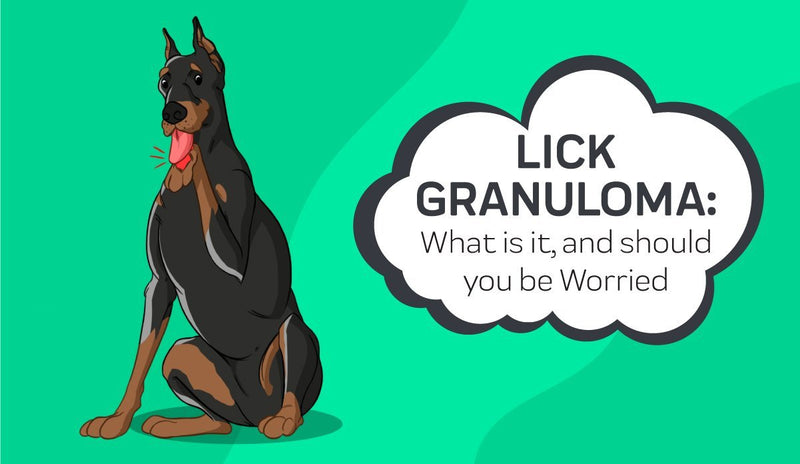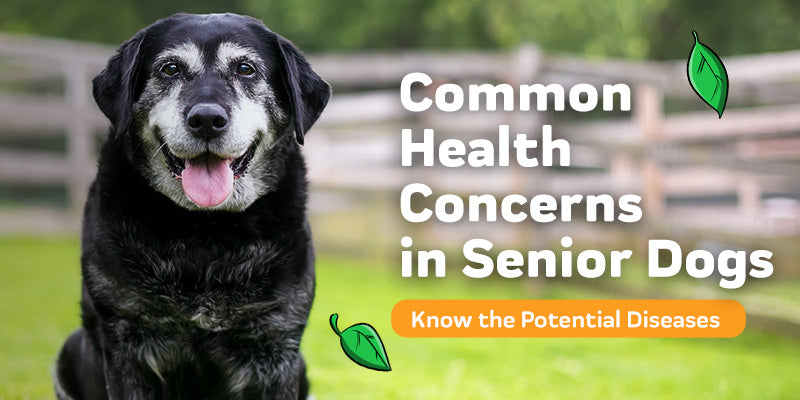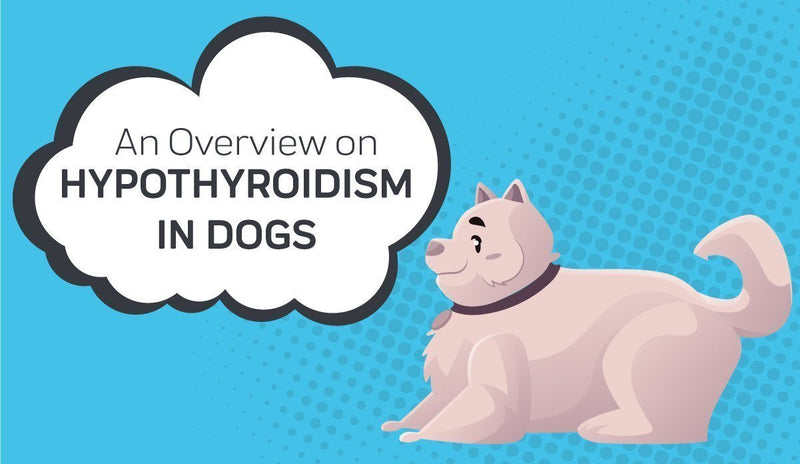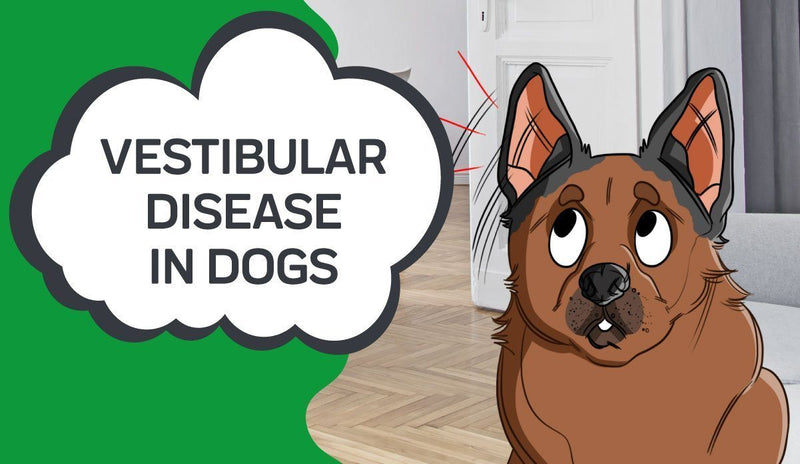- What is a Lick Granuloma?
- Why do they Lick so Excessively?
- Dog Breeds Prone to Lick Granulomas
- Diagnosing Lick Granuloma In Dogs
- Side effects of Lick Granuloma
- Treatmentv
- Conclusion
 Have you ever seen your dog licking itself excessively sometimes for several minutes? Of course, you have, one of the most infamous behavioral traits of a dog is that they relentlessly lick themselves. The constant sound of your dog smacking the same patch, again and again, can be quite irritating, as they just don’t seem to stop. Most owners cannot stand the sound of their four-legged friend's excessive licking of themselves, so they often tell them to stop, or just apply a bandage or anything else to stop that noise.
Have you ever seen your dog licking itself excessively sometimes for several minutes? Of course, you have, one of the most infamous behavioral traits of a dog is that they relentlessly lick themselves. The constant sound of your dog smacking the same patch, again and again, can be quite irritating, as they just don’t seem to stop. Most owners cannot stand the sound of their four-legged friend's excessive licking of themselves, so they often tell them to stop, or just apply a bandage or anything else to stop that noise.
While it is not necessarily a problem for your canine to be indulging themselves in the fantastic sensation of constant licking, you still be cautious of a condition that your dog may be suffering from; a lick granuloma. It is a symptom that even the most avid of pet enthusiasts tend to miss and can lead to something much more severe. This means that all of the licking that your canine is up to may actually be bad for them.
So, to better understand the reason behind your dog's incessant licking and smacking, in this guide we will discuss the possible symptoms, causes, and cure for the lick granuloma, regardless of how it may make you cringe.
What is a Lick Granuloma?
Lick Granuloma is when your dog happens to lick themselves in a place repeatedly until that place happens to swell, bruise or worse get infected. Unless you haven’t paid a lot of attention or have never been to close to your dog, their tongues happen to be very rough. As a result of constant licking the skin becoming incredibly sore, which is an unable to heal self trauma. The reason why this wound is unable to heal properly is due to the wound being agitated all the time. When the dog licks the wound, bacteria begin to settle into the system, and this infects the wound, which in turn begins to feel itchy and starts the itch lick cycle. This is very dangerous as this process of your dog licking its wound can turn into a serious problem. It may reach a stage when the wound is no longer capable of healing.Moreover, this itch lick cycle of self trauma will not stop unless you intervene, as your dog will not stop licking on their own. With all of this discussion about a lick granuloma, you might be wondering what granuloma is.
To put it simply, a granuloma is the first response a dog’s body has to an infection, inflammation, or the presence of a foreign substance. It is a mass of tissue that is often very visible, even from afar. In the way that our body’s first response to any injury is pain, the same way a granuloma indicates that there is a foreign substance in the body.
Another name for lick granuloma is also known as acral lick dermatitis. Dermatitis refers to any skin condition that arises from any type of irritation. Dermatitis is not threatening to the life of your four legged friend, but it can lead to the infected area becoming red and swollen. Dermatitis can also lead to various blisters on the infected place, which can be harmful to your canine.
Why do they Lick so Excessively?
A lick granuloma is one of the most confusing ailments to affect any dog. Not only is it hard to pinpoint exactly why your dog is licking itself, but the reasons for licking themselves can be quite confusing and strange.
Regardless, it is important for you to understand the many reasons that can cause your dog to lick himself, so you will be better prepared to face this peculiar problem.
Boredom
One of the most famous theories among various veterinarians is that dogs lick themselves simply because they are bored. Licking is one of the ways that a dog grooms himself; so, in essence it is no way harmful for them, and at times it is necessary for them.
However, when bored, it is very common for dogs to resort to licking. Various veterinarians hold boredom as one of the core reasons for lick granuloma in dogs; various dermatologists also believe that constant licking is simply a way for you canine to pass time.
Allergies
Many veterinarians also believe that some dogs are extra sensitive to dermatitis, which means that simply being too close to a fellow canine can be dangerous for them. Since a lick granuloma is a skin condition, it is possible for it to spread from one dog to another through touch. Although some dogs are more prone to this form of transfer, it is still beneficial for you to be cautious and know which dogs your canine tends to mingle with.
Joint Pain
Joint pain is also a very famous theory among various veterinarians and is the one that makes the most sense. As dogs tend to get older their joints and bones tend to get much weaker just like humans.
As the pain slowly intensifies, they try to sooth the pain in their joints by licking. This obviously causes more harm than good, as their excessive licking of various joints in their body can lead lick granuloma. Regardless of the reason for the pain, whether it is due to an injury, old age, or arthritis, the pain and irritation tends to make them very uncomfortable; thus, they resort to licking themselves. This is not only limited to joint pain, as aches or pain in their bones can have the same effect. This is because the main cause of lick granuloma in dogs is pain and irritation, which then leads to a dog's licking of themself.
Psychological Issues
Due to the nature of dogs, most people tend to negate the fact that all dogs are susceptible to psychological or mental trauma. This is obviously false, as dogs are very tender and sensitive animals that can take offense to the most menial of actions.
Whatever the reason is for the stress (eg. separation anxiety), a dog will respond accordingly. While at a very concerning level, a dog will resort to aggressive behavior and may lick himself.
Licking, among other things, is a way for your canine to relive stress and try to calm himself. If there is no way that stress can possibly be the reason, then it is possible that your dog may be suffering from Obsessive Compulsive Disorder or OCD.
Many find it hard to believe, but canines can suffer from obsessive compulsive disorder, which is very similar to what humans go through. This obsessive and compulsive behavior can cause your dog to continuously licking himself, which can in turn lead to lick granuloma.
Injuries
Possibly the most common reason for your canine to get a lick granuloma is an injury or a splinter. As much as you hate to admit it, your four legged canine friend tends to get himself hurt more often than you would like. The first reaction that your dog tends to have toward any injury is obviously to lick it.
In this scenario, licking can actually cause more damage than ordinary licking. Since the wound is open, the bacteria from your dog’s saliva tend to make its way into the flesh, and can lead to a very serious infection. In the case of a splinter, due to excessive licking your dog may actually push the splinter further inside, and then a granuloma can cover the affected area making it for a very dangerous situation.
Dog Breeds Prone to Lick Granulomas
Like most diseases and ailments there are always certain dog breeds that prone to the effects of this disease. Lick granuloma is no exception as there are a number of large breed dogs that are more commonly affected to this disease than others.
This is not to say that other dog breeds are completely immune to this disease; rather, they are less likely to contract the illness. There is no breed that is safe from a lick granuloma, as all of the underlying causes that lead to a lick granuloma are very natural.
Moreover, seeing how there is no imminent threat to the well-being of your canine due to the disease, there is nothing to be worried about.
Here are the following breeds that are most susceptible to lick granuloma:
- German Shepherds
- Irish Setter
- Golden Retriever
- Labrador Retriever
- Great Danes
- Doberman Pinscher
Although it is true that all of the aforementioned dogs are more susceptible to the effects of lick granuloma, no dog is immune. Lick granuloma does not play favorites, which means that your Chihuahua or poodle can also contract a lick granuloma.
Diagnosing Lick Granuloma In Dog
Diagnosing the cause of lick granuloma can, at times, be a very challenging feat for any veterinarian, as there are a multitude of different factors that could lead to the illness. More often than not your veterinarian will first want to rule out any possibility of the lick granuloma being the result of an allergy. Much like humans, dogs can sometimes be very sensitive to certain tastes and smells, making it important for you to understand what your four legged friend is allergic of.
Dogs can sometimes have an allergy to food that they eat or various objects that they interact with on a daily basis. It is very important that you are able to find whether or not your dog is allergic to anything that they come in contact with, so that you can stop your dog.
Once the veterinarian rules out the possibility of the lick granuloma being the result of an allergic reaction, they will move on to finding out whether or not your dog is suffering from arthritis. The check for arthritis is done to ensure that your dog does not contract lick granuloma once he heals. That said, if your dog does not respond to treatment, the veterinarian will have to opt for a skin biopsy to check if there is an underlying cause of infection in your dog’s body.
Side effects of Lick Granuloma
A lick granuloma is not an imminent threat to your canine, but the emphasis is on imminent. After a certain time the granuloma can be lead to a variety of different and equally dangerous side effects that can cause serious harm or damage to your canine’s mental or physical health.
All of these side effects can also act as symptoms or indications of lick granuloma.
OCD
OCD is one of the first indications as well as one of the most common side effects of lick granuloma. Seeing how lick granuloma can lead to a very vicious cycle of licking and irritability, it may not come as surprise that this can very likely lead to a very serious case of OCD.
If your veterinarian diagnosis your dog with OCD, you will most likely have to get proper therapy to relieve him of this psychological disorder.
Furunculosis
Furunculosis is an infection that happens due to ruptured hair follicles. Hair follicles can rupture due to a variety of different reasons, and one of those reasons is that hair follicles come in contact with bacteria. This can lead to painful lesions and bald spots among other physical issues.
This can be very dangerous for your canine, as it can lead to a very serious infection and your dog can become immobile.
Bacterial infections
Bacterial infections are possibly the most common with lick granulomas. While bacterial infections often lead to lick granuloma, there are cases where a bacterial infection follows a lick granuloma. Bacteria in their tongue can go into the granuloma, which can in turn cause a bacterial infection.
Treatment
Of all of the factors that can possibly cause the most frustration for a pet owner, the treatment of this peculiar disease takes the number one spot. The main reason for treatment being so frustrating is because of how miniscule their efforts seem to be.
Dog owners often complain that regardless of their best efforts, the granuloma just doesn’t seem to get any better.
Treatment for your canine comes in various shapes and forms. A very common treatment among pet owners is long-term antibiotic therapy, along with using proper topical and oral anti-inflammatory medications.
While these medications do not necessarily heal the sickness itself, they do heal the various symptoms that lead to lick granuloma. By healing and lessening the severity of the symptoms, your dog’s body can heal.
Apoquel
Apoquel is another very infamous treatment option that most dog owners opt for, and has proven to be very effective. Its notoriety mostly stems from the fact that, although this medicine can greatly improve the overall condition of your dog, it can still lead to an alarming number of side effects that can be very difficult to deal with.
Diarrhea is one of the first side effects of Apoquel that your dog may face. Some other side effects that your dog may face are anorexia and vomiting. Vomiting can be quite alarming for any breed of dog, so be sure to keep in contact with your veterinarian. Other side effects include some blood-related disorders, lethargy, subcutaneous lumps, and new cutaneous.
The cost of Apoquel is quite reasonable, and unlike other medicine is not a factor that would influence most peoples’ decision. Apoquel comes in the form of tablets and each costs $2-$3.
Natural Remedies
Natural remedies exist for any ailments that would otherwise affect your dog, and lick granuloma is no exception. There are a multitude of different natural remedies that can help with lick granuloma and can also avoid the risk of further granulomas.
Manuka Honey
There are certain balms that you can apply to the skin of your canine to further improve the healing process. One of these topical remedies includes the Manuka Honey, which is a very effective and safe way of ridding lick granulomas.
By applying this to the infected area three to four times a day, you will be able to reduce the pain and itchiness caused by lick granulomas.
Diet
Most veterinarians tell you to control the diet of your dog to reduce the symptoms of this disease. An imbalanced diet in dogs can lead to a slew of different dermatological problems; so, it is best to ensure that your dog has an optimum diet, and is getting the right amount of fatty acids.
Conclusion
A lick granuloma can be a very frustrating disease for your dog, as it can seem like all of your efforts are useless. However, with time, a little bit of patience, and a little help, you can make a huge difference.
Sources:
Acral lick granuloma
Treatment of canine acral lick dermatitis
Acral Lick Granulomas in Dogs
Approved by:
Dr. Ivana Vukasinovic
Doctor of Veterinary Medicine, University of Belgrade
 Ivana Vukasinovic grew up in Serbia and attended the University of Belgrade where she received a degree in Veterinary medicine in 2012 and later completed a surgical residency working mostly with livestock. Her first year of practice was split between busy small animal practice and emergency clinic, and after two more years of treating many different species of animals, she opened her own veterinary pharmacy where an interest in canine and feline nutrition emerged with an accent on fighting animal obesity. In her free time, she acts as a foster parent for stray animals before their adoption, likes to read SF books, and making salted caramel cookies.
Ivana Vukasinovic grew up in Serbia and attended the University of Belgrade where she received a degree in Veterinary medicine in 2012 and later completed a surgical residency working mostly with livestock. Her first year of practice was split between busy small animal practice and emergency clinic, and after two more years of treating many different species of animals, she opened her own veterinary pharmacy where an interest in canine and feline nutrition emerged with an accent on fighting animal obesity. In her free time, she acts as a foster parent for stray animals before their adoption, likes to read SF books, and making salted caramel cookies.
Thanks for stopping by!
P.S. We Love You!
Sincerely,
The Innovet Team
Please do not ask for emergency or specific medical questions about your pets in the comments. Innovet Pet Products is unable to provide you with specific medical advice or counseling. A detailed physical exam, patient history, and an established veterinarian are required to provide specific medical advice. If you are worried that your pet requires emergency attention or if you have specific medical questions related to your pet’s current or chronic health conditions, please contact or visit your local/preferred veterinarian, an animal-specific poison control hotline, or your local emergency veterinary care center.
Please share your experiences and stories, your opinions and feedback about this blog, or what you've learned that you'd like to share with others.

















